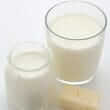Background
- Lactobacillus GG (LGG) is a bacterium that naturally lives in the human gastrointestinal tract. LGG was named after its co-discoverers, Gorbach and Goldin. The scientific name for LGG is Lactobacillus rhamnosus.
- LGG is a probiotic. Probiotics are sometime referred to as "friendly germs." These bacteria and yeast occur naturally in the human gastrointestinal tract, where they help maintain a healthy gut and aid in digestion. LGG is most commonly recommended to treat or prevent diarrhea. It is often prescribed during antibiotic treatment to restore "good" gut microbes killed by the antibiotic.
- There is good evidence for the use of LGG in the prevention of diarrhea or acute infections in children. There is also good evidence for its use to treat or prevent other types of diarrhea, such as that associated with antibiotic therapy. However, LGG does not appear to be effective for prevention of atopic dermatitis or in maintaining remission of the inflammatory bowel disorder Crohn's disease.
- The reported effects of LGG in clinical trials are based on studies using live and freeze-dried LGG, usually suspended in a liquid, such as a rehydration drink, milk, or water. LGG can also be obtained from some dairy products, including yogurt.
References
- Banaszkiewicz A, Szajewska H. Ineffectiveness of Lactobacillus GG as an adjunct to lactulose for the treatment of constipation in children: a double-blind, placebo-controlled randomized trial. J Pediatr 2005;146(3):364-369.
View Abstract - Forsyth CB, Farhadi A, Jakate SM, et al. Lactobacillus GG treatment ameliorates alcohol-induced intestinal oxidative stress, gut leakiness, and liver injury in a rat model of alcoholic steatohepatitis. Alcohol 2009;43(2):163-172.
View Abstract - Gotteland M, Cruchet S, Verbeke S. Effect of Lactobacillus ingestion on the gastrointestinal mucosal barrier alterations induced by indometacin in humans. Aliment Pharmacol Ther 2001;15(1):11-17.
View Abstract - Lam EK, Tai EK, Koo MW, et al. Enhancement of gastric mucosal integrity by Lactobacillus rhamnosus GG. Life Sci 2007;80(23):2128-2136.
View Abstract - Malin M, Suomalainen H, Saxelin M, et al. Promotion of IgA immune response in patients with Crohn's disease by oral bacteriotherapy with Lactobacillus GG. Ann Nutr Metab 1996;40(3):137-145.
View Abstract - Nase L, Hatakka K, Savilahti E, et al. Effect of long-term consumption of a probiotic bacterium, Lactobacillus rhamnosus GG, in milk on dental caries and caries risk in children. Caries Res 2001;35(6):412-420.
View Abstract - Ozkinay E, Terek MC, Yayci M. The effectiveness of live lactobacilli in combination with low dose oestriol (Gynoflor) to restore the vaginal flora after treatment of vaginal infections. BJOG 2005;112(2):234-240.
View Abstract - Pant N, Marcotte H, Brussow H, et al. Effective prophylaxis against rotavirus diarrhea using a combination of Lactobacillus rhamnosus GG and antibodies. BMC Microbiol 2007;7:86.
View Abstract - Pelto L, Isolauri E, Lilius EM, et al. Probiotic bacteria down-regulate the milk-induced inflammatory response in milk-hypersensitive subjects but have an immunostimulatory effect in healthy subjects. Clin Exp Allergy 1998;28(12):1474-1479.
View Abstract - Piirainen L, Haahtela S, Helin T, et al. Effect of Lactobacillus rhamnosus GG on rBet v1 and rMal d1 specific IgA in the saliva of patients with birch pollen allergy. Ann Allergy Asthma Immunol 2008;100(4):338-342.
View Abstract - Piirainen L, Kekkonen RA, Kajander K. In school-aged children a combination of galacto-oligosaccharides and Lactobacillus GG increases bifidobacteria more than Lactobacillus GG on its own. Ann Nutr Metab 2008;52(3):204-208.
View Abstract - Rautava S, Arvilommi H, Isolauri E. Specific probiotics in enhancing maturation of IgA responses in formula-fed infants. Pediatr Res 2006;60(2):221-224.
View Abstract - Szajewska H, Ruszczynski M, Radzikowski A. Probiotics in the prevention of antibiotic-associated diarrhea in children: a meta-analysis of randomized controlled trials. J Pediatr 2006;149(3):367-372.
View Abstract - Szajewska H, Skorka A, Ruszczynski M, et al. Meta-analysis: Lactobacillus GG for treating acute diarrhoea in children. Aliment Pharmacol Ther 2007;25(8):871-881.
View Abstract - Viljanen M, Kuitunen M, Haahtela T,et al. Probiotic effects on faecal inflammatory markers and on faecal IgA in food allergic atopic eczema/dermatitis syndrome infants. Pediatr Allergy Immunol 2005;16(1):65-71.
View Abstract







